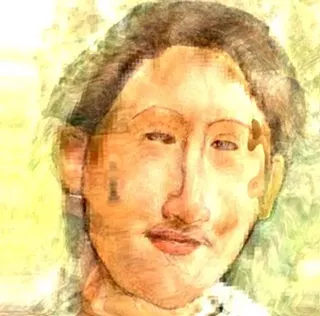Interestingly, though, the plays themselves look back--they involve characters delving into the past.
Each play takes a different approach to finding truth in the past. ATC's artistic director, David Ira Goldstein, has pointed out that Felix Pire's The Origins of Happiness in Latin uses the five senses to evoke growing up in a Cuban-American family in Florida. The heart is the point of departure and arrival for Michael Healey's The Drawer Boy, in which a young man begins to learn an old secret harbored by two elderly farmers. And the mind in all its might and complexity lies at the center of Michael Frayn's Copenhagen, which revolves around a mysterious 1941 meeting between two European scientists that may have related to Nazi Germany's work on an atom bomb.
"Being involved in the choosing of the plays, I don't think it was a conscious point that we ended up with plays where the truth comes out by telling stories over and over again," says Andrew Traister, ATC's associate producer and the director of The Drawer Boy. "The selling point was that all of these have won major awards--The Drawer Boy got Canada's Governor General's Literary Award for drama, Copenhagen got the 2000 Tony for best drama and The Origins of Happiness in Latin won ATC's National Latino Playwriting Award. I think that it's just by happenstance that they deal with people finding the truth by telling or retelling stories."
The most direct storyteller in this trio of full-length plays is Pire, whose one-man show recounts the fun and foibles of his extended family. Although the play specifically concerns growing up as a Cuban American in Miami, Pire says the stories aren't so different from those of Mexican-American families in Tucson, or, indeed, families of any sort in America.
"I think the laughter that's involved and the life lessons you learn from a family are universal," he says. "We all come from the human culture, and we all know what it is to experience epiphanies and emotions created by the clashes in our family, or by the laughter in our family."
In the course of his 90-minute show, Pire plays 10 different characters, although most of the narrative is through his own voice. Holding the stage that long by himself is not an easy task, he says. "But it's as rewarding as it is difficult. In a strange way I feel accompanied by all the characters coming to life on stage; they're reflections of myself, but they're not really me. It's like getting on a roller coaster: You step on stage in the beginning and it's such a wild ride that you don't really remember anything until you step off. Or maybe not so much a roller coaster; I ride the laughter as if I were on a surfboard."
The Drawer Boy is about as far removed from Cuban-American culture as can be; it's set on a Canadian farm, where a naïve young actor has gone to do research for an upcoming play. Gradually and unexpectedly, he coaxes a long-held secret out of the two old farmers he meets, one of them mentally challenged. Yet like Origins of Happiness, Drawer Boy transcends its setting.
"It's about discovery and what we do to cover up the pain in our lives," says director Traister. "Except for a few specific geographical references, this could've been written by anybody where there's a farm and people wounded by war or something that happens in their lives. I think that's why the play is being done so much, because it doesn't reflect a specific nationality. After all, you wouldn't say Godot is just an Irish play.
"It's one of the better new plays that's come across my desk. It's one of those wonderful theater pieces that makes you laugh and cry and think about what we do in our lives, and why we do it."
If there's a timelessness to the issues raised in Drawer Boy and The Origins of Happiness, Copenhagen is unexpectedly timely. Three characters--scientists Werner Heisenberg and Niels Bohr, and Bohr's wife--reflect from their different points of view, Rashomon style, on the truth behind an informal meeting between the estranged scientists on the eve of the nuclear age.
Heisenberg led Germany's nuclear fission research during World War II, and today is best remembered as the father of quantum mechanics and the originator of the uncertainty principle, which holds that increasing the accuracy of measurement of one observable quantity increases the uncertainty with which other quantities may be known. Heisenberg was dealing mainly with measuring a subatomic particle's velocity versus its position, but his principle has rich metaphorical implications.
"Fundamental to it, in relation to this play, is the suggestion that memory is a selective entity," says director Stephen Wrentmore. "The issue being that not only over time does memory shift, but it can become corrupted by suggestion, and also at the end of the day, memory is subjective. You put yourself at the center of your own dramas, and, in your memory, the issue is always about yourself. And the uncertainty principle suggests that the object is changed by the observer, so by extension the whole notion of motive becomes corrupted by the person who suggests motive."
Thus, the conflicting notions of why Heisenberg consulted his old mentor, Bohr. Was it to obtain information useful to the development of a German bomb? Was it to beg forgiveness for his work on the bomb? Or was there some other motive? This has long been a matter of conjecture and dispute; as Wrentmore says, "There are 10 missing minutes in the history of the nuclear bomb."
With tensions over Korea's nuclear program, and the assumed presence of weapons of mass destruction used to justify America's invasion of Iraq, Wrentmore notes, "I think this is a remarkable time to do this play because it's asking questions about where the weapons of mass destruction came from in the first place. What the play deals with is the argument that as scientists we have the moral right to explore things that we know the moral consequences of. Part of what's going on in the world right now links directly to that.
"The essential thing for me is that it's a play that deals with scientific issues, but it isn't a play about science. It's about human beings, two men with real human problems about friendship, about devotion, about love. And then it deals with the practical effects of science against the beauty of theory.
"Heisenberg says in the play, 'It would be a mistake to think that one loved one's country less because it happened to be in the wrong.' That links into our present moral question. There may be problems with nationalism, but one can't help loving where one comes from."










